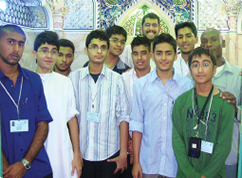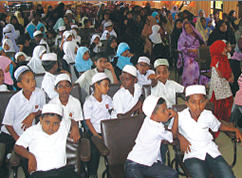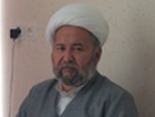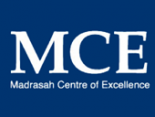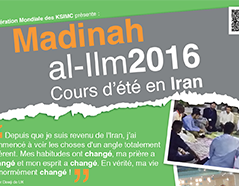The World Federation is pleased to announce that applications are now open for an Islamic Short Course for couples, to be held in Qum. The course is ideal for couples to gain a deeper understanding of Islam for the future of their lives together.
Recommended Acts of Worship During Ramadhan
Although the entire month of Ramadhan is important and we should not waste a single minute of each and every day, engaged in some form of worship of Allah – whether it be praying, recitation of the Quran, or even the remembrance (dhikr) of Allah as we go to work and school, there are special acts of worship which we must seek and perform this month.
Recitation of the Quran
One of the best of deeds during the nights and days of Ramadan is the recitation of the Quran. The believers should try and recite it differently than how they may be reciting it in other months – as it is in Ramadhan that the Quran was revealed to the Prophet (s). We should try to, in addition to reading the Arabic text, dedicate some time to read the translation and also delve into the commentary of the Quran so that we may better understand its contents. The Book of Allah was sent down as guidance and inspiration and one of the ways which we can tap into that benefit is to understand what we are reading. In the standard print of the Noble Quran, each juz’ or section has been divided into about 20 pages, and therefore, the recitation of the Quran can easily be divided into five portions of four pages each for each of the five daily prayers - or however is convenient according to one’s daily schedule.
The late Shaykh ‘Abbas al-Qummi has stated in Mafaatih al-Jinaan that the reward of reciting the Quran is doubled when its recitation is dedicated to the souls of the fourteen infallibles (a) by dedicating each recitation to each one of them. According to some narrations, the reward of one who dedicates the recitation of the Quran to the infallibles (a) is that one shall be included with them on the resurrection day. Therefore, before we recite the Quran, we should make the intention that Allah gift the reward of our recitation to the infallibiles – no doubt we will also receive the reward, however we can also spread the rewards by including others in our daily intention.
Recommended Rites
Although there are many acts of worship which we can engage in during this blessed month, and they can be found in books such as Mafaatih al-Jinaan, A Manual of Ramadhan Devotions and many other books, the period of breaking the fast is perhaps one of the most important for the believer. Not only are they finally given a chance to eat and drink, after having spent so many hours abstaining from consuming anything, but they are now being invited by Allah to partake in His banquet – not only of food and drink, but the evening prayers, and the special supplications which are read shortly thereafter which further magnify the rewards and blessings.
The following are some recommendations to be performed at the time of breaking the fast:
- Although the intention (niyyah) of the obligatory (wajib) fast is until maghrib, however it is recommended to postpone breaking the fast until after finishing the isha or at the minimum the maghrib prayer unless one is too weak to keep fasting and can’t focus on their prayers or if people are waiting to break the fast altogether.
- It is obligatory to break the fast with legally attained food and one of the best things to break the fast with is dates.
- It is recommended to say the following short supplication:
أَللّٰهُمَّ لَكَ صُمْتُ وَ عَلَى رِزْقِكَ اَفْطَرْتُ وَ عَلَيْكَ تَوَكَّلْتُ
O Allah! Indeed I have fasted for You and I have broken my fast with what You have provided as sustenance, and I have relied solely upon You.
In this short supplication, we express our sincerity and submission in obedience; the recognition of our need for His provision and the fact that despite all of our personal efforts, ultimately we rely on Him for all of our success.
The traditions tell us that the person who says this prayer at the time of breaking their fast will be awarded by Allah a reward equivalent to the reward given to all those who had fasted on that day. Perhaps this great reward has been mentioned because when reading and internalizing such a supplication in our lives, we are trying to reflect the higher spirit of fasting, which ultimately is something which all of mankind should aspire to achieve.
It has been narrated that Imam Ali (a) used to say the following prayer when he would break his fast:
بِسْمِ اللّٰهِ أَللّٰهُمَّ لَكَ صُمْنَا وَ عَلَى رِزْقِكَ اَفْطَرْنَا فَتَقَبَّلْ مِنَّا إِنَّكَ أَنْتَ السَّمِيعُ الْعَلِيمُ
O Allah! Indeed we have fasted for You (sincerely and obediently) and we have broken our fast with what You have provided to us as sustenance (out of Your Mercy), so then accept this act from us (with reward, spiritual elevation and salvation) as Indeed it it You alone who are the All-Hearing (of our pleas), All-Knowing (of our godly motives).
It is recommended to say the following prayer, asking for forgiveness, at the first bite of food with which the fast is broken:
بِسْمِ اللّٰهِ الرَّحْمَنِ الرَّحِيمِ يَا وَاسِعَ الْمَغْفِرَةِ اغْفِرْ لِي
In the name of Allah, the Most Gracious, the Most Merciful. O one of expansive forgiveness, please forgive me (as a Reward for my restraint from sinful behavior during the fast).
- It is recommended to recite Surah al-Qadr (97) at the time of breaking the fast as this act connects the worshipper to the spirit of the holy month.
- It is recommended to give something in charity at the time of breaking the fast and to offer food to others who are fasting – even if it be something as ‘little’ as a single date or a drink of water. In this regards, the late ‘Allamah al-Hilli in al-Risalah al-Sa’diyyah has narrated that Imam Ja’far al-Sadiq (a) said, “Any believer who feeds another believer with a single bite of food in Ramadan, Allah will decide for him the reward of freeing thirty believing slaves and will respond to his prayers.” It may be that this has been perscribed for us because the spirit of fasting arouses compassion for the hunger and other basic needs of fellow beings, and so enacting that spirit is worth freeing needy slaves.
Pre-Dawn Acts of Worship
Another important time during the blessed month of Ramadhan is the early dawn when the believers wake to eat some food to prepare them for the arduous day of fasting ahead of them. This is an extra special time and even if a person does not feel like eating a full meal, we have been highly advised not to neglect having the early dawn meal (suhur) even if it be a single date or a drink of water. One tradition reads that Allah and His angels bless those who implore for His forgiveness at the last hours of night and have the early dawn meal.
In addition, it is recommended to recite Surah al-Qadr at early dawn (sahar), and a tradition states that any believer who recites Surah al-Qadr at the early dawn meal and at the breaking of the fast meal (iftar), will be counted as one who has sacrificed his life for the sake of Allah between these two times. Perhaps it is because the person’s has enlightened his spirit to surrender to the Wise Decree of his Lord.
Further reading:
Related News
The Islamic Education Department of The World Federation recently published 3 books on the request of Sheikh Mahmood Fayyaz’s Najaf Office.
We are pleased to share with you results from our consultations with key stakeholders pertaining to MCE’s draft Tarbiyah curriculum framework.






